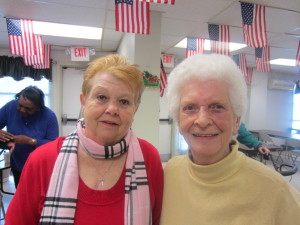Our Residents
Don’t be a victim: Advice for the elderly
A few words from the wise should keep residents at Springfield Housing Authority’s Saab Court safe from thieves and predators.
Representatives from the offices of the SHA Public Safety Department, the Hampden County District Attorney and Greater Springfield Senior Services paid a visit to the community room in the downtown public housing development and gave residents a few important pointers on steering clear of potential threats.
In particular, they focused on phone calls from scam artists, and visits from people who may want something sinister, well beyond the offer of friendship and goodwill.
Speakers included SHA Public Safety Administrative Assistant Michelle Ricker, Assistant District Attorney Joan O’Brien, Victim Witness Advocate Danielle Hultgren and Protective Services Officer Ann Sabato.

Springfield Housing Authority Executive Department Manager Fidan Gousseynoff, center, translates the safety seminar with Saab Court residents Tamara Pochkhuoa, left, and Viktor Mietolkin,right.
O’Brien began the morning session with some scary data and strong warnings about telephone calls aimed at bilking people of their bank account savings. While many victims are unsuspecting and trustful, she noted that some $2 billion is taken annually from elderly people in phone scams across the United States, and Greater Springfield is a part of that statistic.
“Criminals and scam artists are getting smarter and smarter,” she said. “As soon as we figure out one scam, they figure out a new one.”
One new phone scam involves a caller identification that appears to come from the Internal Revenue Service. “The IRS will never call you,” O’Brien said.
Another recent one includes a tearful, frantic phone call from a relative – usually young – who claims to be in another country, in trouble, and needing quick cash.
“When you’re really upset, you don’t think rationally. They want you to wire the money right away – you will never see that money again,” she said.
Sabato warned participants to be careful with their financial information, especially as they get older and may have visual, mobility or cognitive issues.
“You pick someone you know and trust to help you with your finances – but make sure that more than one person is involved. If you have five kids, they should all know about who is helping you,” Sabato said. “If the one who’s helping you doesn’t want the others to know, it’s time to pick another helper.”
Hultgren walked participants through the process of the District Attorney’s Office Victim Witness Program, which features a person assigned to stand by those who end up being victims of crimes. That helper would ensure that a victim of a crime understands and receives the mandates of the Massachusetts Victim Bill of Rights, aimed at ensuring that victims have a voice in the court process.
Among the advice given at the session included:
- Don’t answer any questions posed during phone calls from strangers, no matter how convincing they may sound.
- Keep any personal or banking information to yourself during these phone calls.
- Hang up quickly on phone calls thought to be bogus.
- Alert police to those same phone calls so that they may alert the general public of a scam in process.
- Hold pocketbooks tightly onto your shoulder when shopping.
- Check monthly banking and credit card statements carefully for charges you haven’t incurred.
- Assume that offers sounding too good to be true are just that – too good to be true.
- If you give someone power of attorney, be sure you maintain access to all accounts – and check regularly, or have another person check, their work.
- Know where your legal and financial documents are stored, and check regularly that they are there.
- Avoid giving anyone access to your credit and debit cards, even for small errands.
Sabato said elderly people are often enough ripped off by people who they have trusted with their money.
“Three-quarters of cases we see of financial abuse are done by someone who has power of attorney,” she said. “In the right hands, it’s a marvelous tool – but you need to be careful.”

Saab Court Tenants Association President Frida Venage said seniors are well-advised to be aware of steps they can take to protect themselves.
Sabato also warned about placing too much trust in people hired to help with personal care, including housecleaners and home health care aides. “Never given people your bank cards to do errands for you. Be careful – you want to be kind, you want to be a good person or a good relative, but you must protect yourselves,” she said.
Residents responded to the session with frequent participation and afterwards, with high praise. Saab Court Tenants Council President Frida Venage told a story about a former personal care assistant who charged $5,000 to her credit card.
“We need meetings like this to keep us all aware of what can happen out there. People must realize that not everyone is a good person, and there are things you can do to stay safe,” she said.
Saab Court resident Elizabeth Wallace agreed.
“This was wonderful, very informative,” she said. “They talked about things that I wanted to hear. I learned a few things for sure.”
Resident Marilynn Hallas said the session gave her reason to pause, in a good way.
“It was very impressive. It make me think of a lot of things I can do,” Hallas said.








